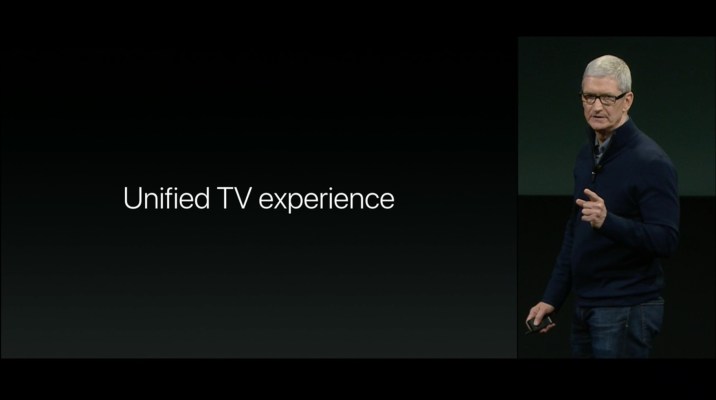
Apple has answered two questions in one day, or rather a CNBC report citing someone within the company has. Why are the shows it’s planning so allegedly boring? And what does it plan to do to get a foot in the door in an increasingly competitive streaming-media market? They’re going to repeat the success they had with U2’s “Songs of Innocence” and just shunt it right onto everyone’s device.
To be clear, the report suggests that Apple will give its original content away for free to anyone with an iOS or tvOS device (Macs appear to be excluded). Users will find a shiny new app early next year called “TV,” in which will be Apple’s full lineup of PG-rated comedy and drama, free of charge.
Users will have the opportunity to subscribe to “channels,” for instance HBO, through which they can watch shows from those providers. Who will be allowed on this platform? It’s unclear. How will the billing work? Unclear. Will it replace standalone apps for the likes of Netflix? Unclear. How will it differ from iOS to tvOS? Unclear.
The only thing that is clear is that Apple is working from a position of massive leverage as the only company that can or has reason to launch a shared media channel through a billion-dollar giveaway. No doubt there will be other ways they’ll pinch the competition: search and Siri functionality will probably be better for TV; it’ll have integrations with other first-party apps; they’ll default users to using the TV app when they find a show they like — that sort of thing.
Some of you may be wondering: Can Apple really just spend a billion dollars on content and then give it away for free? The answer is unequivocally yes. This company is rich beyond imagining and they could do this every year if they wanted to (and in fact they might have to for a bit). Besides, this is a billion-dollar investment in a platform it hopes to entrap every other popular media company in.
Here’s the plan: First you get a base level of okay shows on the TV app so it isn’t a wasteland and people can get used to it always being there along with the other two dozen permanent apps. Then you nag some partners and channels into putting their stuff on there because it’s a “more streamlined experience” or something and collect rent when they do.
Once you have critical mass you reveal your second round of content — the good stuff — and a ridiculously cheap price, like $30 per year, or less bundled with iCloud stuff. Apple doesn’t need to make money on this, unlike other companies, so it can charge literally whatever it wants. Too low and people think it’s just a hobby, too high and they won’t pay for it on top of Netflix and HBO. Sweeten the deal with special pricing you wring out of channels because they can’t afford to leave this new walled garden, and say consumers come out ahead.
Meanwhile of course this is only available on Apple hardware, so you lock people into the ecosystem more, and maybe even sell a few Apple TVs.
Ultimately what they’re doing is buying their way into the market with a big up-front payment to shift and lock a non-trivial portion of the existing audience into their own app — a familiar maneuver.
The money, well, they’ve already spent that. And possibly on content of questionable quality. That’s the one big fault in the plan: Apple’s squeamishness may result in a TV app with a bunch of garbage on it, in which case (hopefully) no one will use it at all and the company won’t get the leverage it needs to bully other media companies into joining up.
You may remember how this kind of forced-content play worked out with U2. After they put “Songs of Innocence” on everybody’s computer, the backlash was so strong that Bono personally apologized. Turns out Apple isn’t actually a tastemaker — they just make the phones that tastemakers use.
In that case it may be that their quest to unseat the actual tastemakers of this era — the likes of Netflix and HBO, which rebuilt the TV industry from the ground up — is quixotic and doomed to failure (or at least a period of ignominious limbo).
Be the first to comment